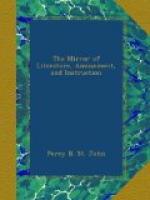Bandinella, the Sculptor, by Corregio, is a most beautiful portrait. The face of the sculptor is full of vivid expression, and the gold chain about his neck is almost a deception. This painting, and a Holy Family, are all we find of the great Corregio at Hampton Court.
Charles the First, on horseback, by Sir A. Vandyke, is certainly much superior to the portrait of William, mentioned above. As a painter, Sir Godfrey cannot be ranked with Vandyke, though, I believe, the former considered himself much higher in the arts than the latter. The picture before us is an admirable specimen of Vandyke’s powers.
George the Third, likewise on horseback, reviewing his troops on Hounslow Heath, by Sir William Beechey, R.A. This picture is unquestionably one of Sir William’s best productions, and does honour to the fine arts of this country. With the above portraits, there are others by West, &c., which possess considerable merit.
There are, also, several choice specimens of Titian, Holbein, and Domenichino; with a few cabinet pictures in the Dutch school, by Teniers, Ostade, &c. In this palace are Raphael’s celebrated cartoons, which are too well known to need describing in this place. G.W.N.
* * * * *
THE SELECTOR; AND LITERARY NOTICES OF NEW WORKS.
* * * * *
A BALLAD SINGER.
A Ballad-Singer is a town-crier for the advertising of lost tunes. Hunger hath made him a wind-instrument; his want is vocal, and not he. His voice had gone a-begging before he took it up, and applied it to the same trade; it was too strong to hawk mackerel, but was just soft enough for “Robin Adair.” His business is to make popular songs unpopular,—he gives the air, like a weather-cock, with many variations. As for a key, he has but one—a latch-key—for all manner of tunes; and as they are to pass current amongst the lower sorts of people, he makes his notes like a country banker’s, as thick as he can. His tones have a copper sound, for he sounds for copper; and for the musical divisions he hath no regard, but sings on, like a kettle, without taking any heed of the bars. Before beginning he clears his pipe with gin; and is always hoarse from the thorough draft in his throat. He hath but one shake, and that is in winter. His voice sounds flat, from flatulence; and he fetches breath, like a drowning kitten, whenever he can. Notwithstanding all this, his music gains ground, for it walks with him from end to end of the street. He is your only performer that requires not many entreaties for a song; for he will chant, without asking, to a street cur, or a parish post. His only backwardness is to a stave after dinner, seeing that he never dines; for he sings for bread, and though corn has ears, sings very commonly in vain. As for his country, he is an Englishman, that by his birthright may sing whether he can or not. To conclude, he is reckoned passable in the city, but is not so good off the stones.—Whims and Oddities. Second series.




